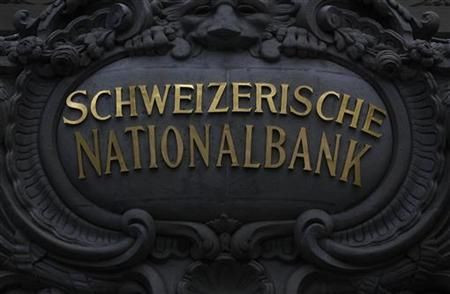SNB Cuts Rates to Counter Steep Swiss Franc Rise

The Swiss National Bank cut its interest rate target band on Wednesday in a surprise move to stem the rapid rise of the Swiss franc, which investors have flocked to seeking harbor from the European and U.S. debt crises.
The SNB said it would aim for a three-month LIBOR interbank rate of "as close to zero as possible" from an already rock-bottom 0.25 percent, and said it would very significantly increase the supply of francs to the money market over the next few days.
The euro shot up in response, gaining two percent on the day versus its Swiss counterpart. The dollar also rose sharply.
But analysts said that trend could prove temporary.
"These measures will at best slow the pace of appreciation in the Swiss franc, as real money is seeking the franc and it's not just speculative flows," said Neil Mellor, currency strategist at Bank of New York Mellon.
Seen as a safe haven from an escalating euro zone debt crisis and fears of a U.S. rating downgrade, the franc has surged from one record to another this year against both the euro and the dollar.
The SNB is the first central bank to cut rates since the global economic outlook deteriorated with expectations for higher rates from the European Central Bank and U.S. Federal Reserve pushed back since signs emerged of a new slowdown.
Swiss business leaders have called on both the SNB and the government to take action against its steep rise but the bank has been criticized for the heavy losses it incurred in its post-crisis interventions in 2009 and 2010 to weaken the franc.
"Since the SNB's last quarterly monetary policy assessment, the global economic outlook has worsened. At the same time the appreciation of the Swiss franc has accelerated sharply during the last few weeks. Consequently, the outlook for the Swiss economy has deteriorated substantially," the SNB said in a statement.
The euro jumped over 2 percent to 1.1066 at 0805 GMT after hitting a record low of 1.0794 on trading platform EBS before the SNB comments. The dollar rose to 0.7764 franc from around 0.7630.
"It makes a lot of sense but remains to be seen how successful it will be as long as the market sees Switzerland as so much better off than the rest of the world," said Julius Baer economist Janwillem Acket.
NEW INTERVENTIONS POSSIBLE
After the Swiss franc rose about 7 percent against the euro in July alone, economists began to warn that a recession could be looming in Switzerland with forward-looking indicators such as the KOF economic barometer pointing to a slowdown.
The strong franc has also begun to hit the Swiss manufacturing sector, data for July showed. In a sign of lower demand, purchases are falling and inventories are rising, data showed on Tuesday.
"The SNB is keeping a close watch on developments on the foreign exchange market and will take further measures against the strength of the Swiss franc if necessary," the bank said.
Analysts said the SNB could choose to resume foreign exchange interventions despite the risk of failure.
"I think the likelihood of further interventions is very high. It's rather unlikely that cutting the interest rate down to zero will be enough," said Commerzbank's Lutz Karpowitz.
The SNB announced last week it suffered a 9.9 billion franc loss on its foreign exchange holdings for the first half of the year due to the surging franc, increasing criticism of Chairman Philipp Hildebrand and making interventions politically more difficult.
Christoph Blocher, a leading figure in the right-wing Swiss People's Party, who has already called on Hildebrand to quit, launched a new attack on Sunday, saying the SNB boss behaved like a speculator and was not qualified for the job.
Swiss interest rate futures pushed back interest rate hike expectations as a result of the SNB's decision and now fully price in a rise in the rate target to 0.5 percent only in June 2013.
The SNB said it intended to expand banks' sight deposits at the SNB to 80 billion Swiss francs from currently around 30 billion francs.
It also said it would, with immediate effect, no longer renew repos and SNB bills that fall due and will repurchase outstanding SNB bills, until the desired level of sight deposits has been reached.
(Writing by Emma Thomasson and Catherine Bosley; editing by Mike Peacock)
© Copyright Thomson Reuters 2024. All rights reserved.





















